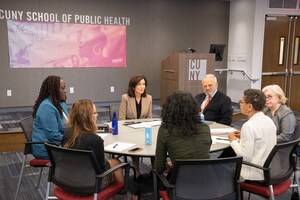CUNY SPH receives $5.2 million NIH grant renewal for cancer genomics research
NEW YORK, June 25, 2024 /PRNewswire/ -- The Informatics Technology for Cancer Research (ITCR) program of the NIH National Cancer Institute has awarded the CUNY Graduate School of Public Health and Health Policy (CUNY SPH) a competitive renewal of $5.2 million in total costs to continue its development of open-source software and databases for cancer genomics. The five-year U24 grant, titled "Cancer Genomics: Integrative and Scalable Solutions in R/Bioconductor," will support years 11-15 of this project.
Led by CUNY SPH faculty Levi Waldron and Sehyun Oh, the project aims to enhance and expand the Bioconductor ecosystem, a cornerstone resource for statistical analysis and data management in cancer genomics research. The grant, totaling $5.2 million, will fund collaborative efforts with the Channing Division of Network Medicine at Mass General Brigham in Boston, the University of Colorado, and the University of Padova in Italy.
"This renewal represents a significant vote of confidence in our past 10 years of work and our ideas for the next five years," said Dr. Waldron. "It will allow us to address the evolving challenges in cancer genomics, particularly in the realm of single-cell and spatial molecular profiling technologies."
The project focuses on four main objectives: expanding infrastructure for multimodal experiments and spatial transcriptomics; transitioning to a federated, language-agnostic data-sharing system; creating curated and integrated data repositories; and developing comprehensive user training programs, including a cloud-based learning platform.
The authors aim to empower researchers with advanced tools and resources for cancer genomics research, potentially accelerating discoveries that could lead to improved cancer diagnostics and treatments.
Media contact:
Ariana Costakes
[email protected]
About CUNY SPH
The CUNY Graduate School of Public Health and Health Policy (CUNY SPH) is committed to promoting and sustaining healthier populations in New York City and around the world through excellence in education, research, and service in public health and by advocating for sound policy and practice to advance social justice and improve health outcomes for all.
SOURCE CUNY SPH







Share this article